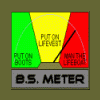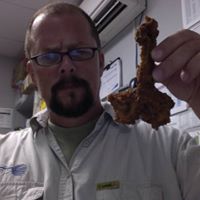Leaderboard
Popular Content
Showing content with the highest reputation on 01/01/2010 in all areas
-
"The clinician need not be afraid of properly palpating the abdomen because no evidence exists that aortic rupture can be precipitated by this maneuver." Article by Dr. Robert E. O'Connor MD Proper assessment provides a differential for the provider to work with..I believe that the OP should have shown the student or basic the proper method to palpation. Definitely using this tool to differentiate (potentially) between a hernia, bowel obstruction, or AAA could be valuable..although all are potential surgical emergencies. Palpation, percussion, and auscultation are invaluable tools, if skills are honed appropriately..IMHO4 points
-
Wow you're arrogant. What was your reasoning behind yanking your EMT's hands from the patient? Was there an obvious pulsating mass that they didn't recognize? You very likely made that EMT feel like a piece of crap, and for what? What could you possibly have taught them by acting out like that? Palpation is an important part of an abdo assessment, unless of course that action is contraindicated. Being an EMT is NOT a contraindication.2 points
-
Let me preface this topic by saying that I am seeking opinions for any and all who care to discuss the topic below. I have been with my current company about five years now, and have had the privlage of working in multiple operations through out the nation. As of recent I moved to the North East and found a practice they have had in place to cause my stomach to churn with doubt. Post a run I am to call into the dispatch center for my run number and times. I do this and am then asked to give to the dispatcher the pt's name, SSN, DOB, and any insurance information should they have insurance. Please understand that I have never done this practice at any other operations I have worked at, and all of those operations have been with this company. I don't feel that a dispatcher has any right to this information nor do they have any need for it. Could this be construed as a violation of HIPPA? While I realize that it's simple patient demographics, I am intrusted with caring for that patient's information and I just don't feel right giving it to a dispatcher. Is my feeling justified? What are you thoughts! This topic has been plaguing me for a month now!1 point
-
HIPAA H I P A A Health Insurance Portability Accountability Act HIPAA WIKI I call it... Understanding how to type the abbreviation "HIPAA".1 point
-
1 point
-
15-25 minutes tops. I dont see how it could take an hour to clear from a hospital. Even our trauma 1 hospital at its prime time will get us cleared in under 30 minutes.1 point
-
Very lucid thinking. I agree, I too have not seen compelling evidence either way regarding palpation. I think we both agree that palpation cannot rule out this or any critical abdominal issue. Furthermore while palpation can support other findings leading to the r/o diagnosis my point is that your conclusion cannot be based on it. After all I have examined perfectly healthy individual and looked at their abdomen only to visually see the normal pulsing of the abdominal aorta. Does this runner with a twisted ankle get treated for a AAA? If we stand back and think of a AAA or hot appendix or perforated bowel, these situations have swollen distended tissue that if left unattended do in fact burst and then the patient dies in seconds. Although there is no study that I am aware of that proves pushing on a thin wall aneursym or a swollen appendix will cause it to burst it would seem a logical assumption, as I have been successful with balloons. In light of the fact that nothing we find during palpation would change our rule out diagnosis that we based on the history vital signs patient presentation etc... I see no need to take the risk because what are the chances of the patient living long enough to make it to surgery if we are wrong. By telling the ER that you suspect an acute abdomen based on history vitals etc...and not pushing and probing you may buy the pt the times he needs to see the pro's on this subject. Above all do no harm.....1 point
-
While this may not be a direct violation of HIPPA, this information does not need to be provided over airwaves. The ePCR or paper PCR can be matched up after shift to provide that information with disclosure of sensitive information that could be used in identity theft, which I think is a bigger threat than a HIPPA violation. Our company policy is to NEVER release a patient name over the air. We do allow age, sex, chief complaint, and disposition over the air. All other data is on the PCR, and has no place in being said over airwaves.1 point
-
1. Abdominal exam not addressed in protocols? This is a standard. How can you potentially treat a patient without a complete and thorough assessment? 2. Do the exam, and if taught properly (non 'poking', but gentle palpation) you could find out much good information that can be disseminated to the ER to prepare them for whatever event. You need to assess for lumps, bumps, masses, palpations, etc. Who knows, it might only be a 'diastasis recti', but without exam, you could hinder the idea of rapid transport of a dissection. 3. We don't teach what is in the chapter per say.....teach the curriculum which includes a good thorough abdominal exam along with history of the event. Teaching the newby Basics any other way could compromise good assessment tools in the future. Don't jump down their throats, teach them the proper way and what to look for, whether they or you can do anything for the complaint or not. Complacency can be a killer. This is only the opinion of this poster.1 point
-
1 point
-
I hope that the new decade of this millennium, is a sight better and more peaceful, than the last.1 point
-
May the new year be filled with joy, love and happiness...and may it be a damn sight better than the last one!1 point
-
EMT's are still taught this, because it is the standard of care, thus it would negligent for an educational institution not to teach it. It most areas, it would also be negligent for a healthcare provider not to adhere to it without specific reason not to. It also concerns me that it surprised you that the EMT attempted to practice his assessment. It surprised you to the point that you had to yank on his hand. Palpation is part of the physical exam and can provide information that supports suspicion of a life-threatening condition. Please elaborate on the situation that occurred, you thinking, and why you assumed we'd all be on the same page with you about not teaching EMT's to palpate.1 point
-
1 point
-
I hear you man. But here's the catch. If you truly want to get your hands dirty, if you really, really want to be a good EMT/Paramedic, then start today. Use spellcheck. Noobs rarely want to hear this, but let me try and make my point this way.... Those that responded, most noted Ventmedic and Dust are terribly competent and experienced. Do you see the difference between their posts and yours? Did you get a feeling for the value of their opinions and advice simply by reading their posts? I'll bet you did. That is what you need people to see of you. Not the 3rd grade posting you've done here. Use punctuation, capitalization, paragraphs, proper spelling. Show those that take the time to respond to you the respect of at least rereading your post before you post it. Intelligent presentation of your ideas counts here. Not always perfect presentation, but something that shows that you can be bothered to spend at least two minutes looking for the information you need. Not to mention that you'll be spending the rest of your career writing untold numbers of reports should you choose this path. So far you've presented as a young, "Show me the guts! Oh, and which way is it to the fire station??" kind of guy. I have a feeling that there is more to you than that...give folks a chance to see it, OK? I'm not sniping, simply trying to give you some information that is often too long coming. Good luck to you. Dwayne1 point
-
I did misread what CHBARE post, as it was 2 am and my ambien was already working too well...My fault... However, the bottom line here is, going back to what HERBIE stated, taking an anemic patient and sticking O2 on them without fixing the underlying issue is going to have relatively little effect. Just spoke to my wife, Board Certified MD ( Anesthesia). You have to fix the underlying hematocrit issue first and foremost.....You can start splitting hairs like some of the posters above have started doing, however, real world application is going to do very little to help anyone... Good Discussion Respectfully, JW1 point
-
Without lab work, how do you know what the actual cause for hypoxia is unless it's blindingly obvious (like trauma)? If the patient is presenting as hypoxic, it's appropriate to provide supplemental O2 in the prehospital environment. That's different than providing it because the angels on my shoulder are whispering that the patient might be anemic, even if the patient isn't presenting as hypoxic. Additionally, as shock and hypovolemia increases, you will start to see affects on the brain and respiratory centers. Just because a patient has one condition that doesn't require a treatment (not just oxygen), doesn't mean that it can't cause other conditions that require a treatment. Additionally, in terms of protocol, the same reason why plenty of protocols require any oxygen given to be delivered via NRB mask if possible. Poor educational standards.1 point
-
Now for personal attacks... You are the one who has stated you do not have a degree because it is not required. I have not used the words "undereducated fool" in any of my posts when speaking of you. Those are your words and if that is how you think of yourself, you might consider getting at least a 2 year degree. Having the letters of a degree behind your name is not a bad thing and should not be viewed so negatively. Do you care to point out the spelling mistakes in post #94? Those are abbreviations for the associations and not misspelled words. In the other post I used Dustdevil's spelling for ass which is arse. Could it be others agree that education is important and one shouldn't wait to be told or made to get it if they want a better understanding of medicine to provide quality care to their patients? Of course it would be nice to have the 2 year degree as a requirement for Paramedics.1 point
-
You bet. I am almost done with paramedic school, and while I am working at my EMT job I still ask my paramedic permission before doing certain things. As a EMT ride along student, your primary responsibility is just to observe. You may be asked to assist with vital signs or other simple procedures within your scope of practice, but other than that, you should not start conducting your own examination of a patient or starting to do something on your own without being asked. My two cents, anyways.0 points
-
Standard part of a physical exam of a patient with a c/c of abdominal pain. Inspect, auscultate, palpate, percuss. Although, a ride along should have asked before he/she preformed patient care in your ambulance.0 points
-
Firstly a query just how does one evaluate PaO2 in the first place ? hint: there is no such critter as PO2 unless it is in a Math formula, may wish to goggle at PAO2 as well. mobey is not just technically correct this exactly one of the reasons that one initiate's supplemental O2 in events of "anemic hypoxemia" please note the difference between hypoxia and hypoxemia as well. Content and Capacity should be reviewed as well on can increase oxygen delivery to tissue using chbars equations by up to 2 volume % in fact at sea level with supplemental O2. The Oxyhemoglobin dissociation curve illustrate affinity and shifts of the ODC something called "postage stamp effect" in regards to affinity of O2 http://en.wikipedia.org/wiki/Oxygen-haemoglobin_dissociation_curve#Factors_shifting_curve This link to some Power Point Education look around you will find Oxygen therapy productions. http://www.ccmtutorials.com/rs/oxygen/page06.htm http://www.templejc.edu/dept/ems/Pages/PowerPoint.html In regauds Could you explain that particularly in regards to dang near every protocol guideline, for shock or blood loss, oxygen is first line drug in suspected cases of all "Anemic Hypoxemia" cheers-1 points
-
My def of amb ass is: When your assigned to the worst car in the fleet with vinyl seats on a hot humid day hungover from the night before of cheap chili, wings and schaffer beer. Its that sweaty feeling you get and wonder if that was a fart or did you just shart. lolol-1 points
-
On going budget issues so no new ambulance for us. 4 years and 75,000 miles is alot of wear and tear in urban ems.-1 points
-
Lets try this approach in teaching this new basic, first don't yank his had away you will freak him and the patient. You need to have control of your student prior to the call as a preceptor. Second try out this explanation on palpation " you are looking for lands mines if you see one or find one don't play with it but you do have to look'. What I am trying to express is that you need to palpate the ab to locate any problems but once that is done we (as basics) really don't the skills to produce any more useful findings threw continued palpation. In summation a palpation of the abdomen should be done at all levels but once a significant finding is found then further examination should be weighted with a cost verse gain approach. It is assumed that all other investigative avenues are being used like history vitals etc.-1 points
-
Hello to all, I decided to join this forum so I could warn any perspective emt or paramedic students about Florida Medical Training Institute. This school does alot of illegal stuff with student paper work and documentation. They also have high failure percentages on there classes. If you are a current student at one of there campuses or looking to attend there, and want more info about why you shouldnt just let me know.-1 points
-
I was called to a 57 y/o man complaining of a sudden onset of mid line abdominal pain while sitting in his office doing some paper work. Patient has a history of hypertension and high cholesterol and is non compliant with his meds. Patient had not eaten lunch yet and tells us the pain feels as if something is "pulling apart" in his belly and lifts up his shirt to reveal an vertical 5-8cm oval lump in his abdomen just off the mid line. While in route to the hospital my EMT "ride along" placed him on oxygen, moves down and begins to palpate the abdomen? I yanked his hands up telling him not touch the any of my patients abdomens, ever! Regardless of what anyone thinks is wrong with this patient, could someone please tell me why we still teach EMTs to palpate the abdomen!-3 points















